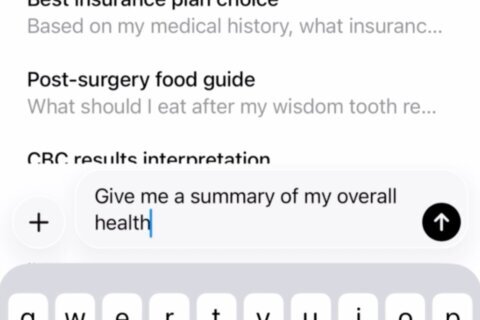Andrea Syrtash was 14 when she first learned she might have trouble having children.
But she never would have guessed that short exchange in the doctor’s office would lead her on a physically, emotionally and financially draining seven-year journey that amounted to 18 fertility treatments and nearly $100,000.
“I knew it might take time [to have a baby] because I was told that, but no one ever mentioned it again,” said Syrtash, who is a relationship expert and author based in Brooklyn, New York.
“It’s just not something we talk about very much.”
These days, Syrtash is talking about infertility — and on a number of platforms. In 2017, she started the online lifestyle magazine Pregnantish, which helps singles, couples and LGBT folks navigate infertility with “credible, not clinical” content. This summer, she’s launching a podcast to share the stories behind the not so linear paths to parenthood. And on May 16, she’ll be one of 250 advocates, led by the national infertility association Resolve, that storm Capitol Hill to advocate for better family policies, including expanded access to fertility treatments.
Syrtash finally met her daughter four and a half months ago, but her fight to bring awareness to infertility is far from over. Here are five things she wants everyone to know about infertility:
Infertility is a medical issue, not a lifestyle issue
The World Health Organization defines infertility, which affects one in eight couples, as a “disease of the reproductive system.” But in society, Syrtash said it’s not always viewed that way.
“A lot of times when you’re going through fertility challenges, people will assume it’s a lifestyle issue and give you advice like, ‘just relax;’ ‘just think positively.’ But if you have a whole range of issues — fibroid tumors, polycystic ovary syndrome, male-factor infertility, blocked tubes — I mean, these are medical issues that may need some intervention,” she said.
And downplaying a clinical diagnosis can have damaging effects.
“The shame that goes with not being able to easily conceive or carry a pregnancy is real,” Syrtash said.
“You just assume when you’re younger — if you want to have kids — that it will happen when you’re ready, that it’s a natural part of being a woman or a man and we have the reproductive organs and it will work. And I think that there’s a lot of shame when it doesn’t.”
Infertility isn’t just a woman’s issue
Both men and women can have problems that cause infertility. According to the U.S. Department of Health and Human Services, one-third of fertility issues are due to the man, and one-third are due to the woman. The other third of cases are a mix or are unexplainable.
“So we have to do a better job of showing that this is not just … a woman’s issue, it’s not just a heterosexual issue. LGBT [individuals and couples] are obviously building families,” Syrtash said.
“This affects so many people, and we need to start telling that story and being more diverse in the way we present it.”
Treatment is really expensive
Like many medical therapies, fertility treatments are expensive — and they aren’t always covered by insurance. Some employers offer benefits, and some states have mandates to either offer or cover some level of treatment. However, the Affordable Care Act does not require coverage for infertility treatments.
Syrtash said even with insurance, costs add up quickly — making many interventions impossible for the financially disadvantaged.
“IVF, on average, can cost easily $15,000 to $20,000, and when you are freezing embryos there are additional costs of storage. If you’re genetically testing your embryos, that’s another cost … So even when it’s subsidized, it’s expensive,” Syrtash said.
And some treatments are simply out of reach. A few states, including New York, ban paid surrogacy contracts, limiting options for those who physically can’t carry a child to term.
“This is the other side of reproductive rights — protecting those of us who need help to build our families through fertility treatments, through adoption … we just need help,” Syrtash said.
Infertility is a relationship issue
In addition to being a medical issue, Syrtash said infertility is also a relationship issue.
“It affects relationships in the deepest way,” she said.
“I don’t know anybody who has gone through fertility treatments or years of infertility who hasn’t had a hard time occasionally at a baby shower or in the grocery store with tons of kids around.”
Syrtash recommends that those struggling with infertility arm themselves with a few “sound bites” they can use when asked provoking questions like, “When are you going to have kids?”
The one she often used was, “I promise I will let you know if there’s any news.” This short response helped her to avoid an emotional unraveling every time she was triggered.
“And then you just change the topic like a good politician,” she said.
And her advice for friends and family of someone struggling with infertility? Avoid the words “just” and “should” at all costs.
“When you’re struggling to build a family, people will say, ‘Why don’t you just adopt?’ ‘Why don’t you just get a surrogate?’ ‘Why don’t you just relax? ‘You should do this; you should do that,’” Syrtash said.
“Your well-intentioned advice actually really stings because you’re unintentionally casting blame on a person with a medical issue.”
Educate yourself
Most people don’t educate themselves on fertility until they are faced with challenges, but in Syrtash’s opinion, why wait?
“It’s really empowering to know what’s happening in our bodies. It doesn’t mean that we have to come from a place of fear,” she said.
“If you want to be a parent, maybe be a bit proactive and figure out what’s happening in your body.”







